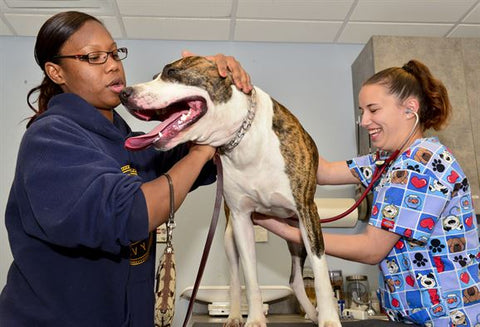Providing our beloved pets with optimal health care is one of the greatest struggles we face throughout our loved one’s lifetime. Many of us can’t afford those regular visits to the vet for teeth cleanings, blood tests, or other necessary testing that our pets need if they become sick or injured.
Often times, we’re facing a mountain of bills and simply can’t justify spending money on a thousand-dollar visit for our pet’s skin allergy or a random bout of nausea that popped up for an unknown reason.
If you have a pet that currently (or may one day) require an above average amount of health care, pet insurance could save you a great deal of money.
How pet health insurance works
Pet insurance works similarly to our own insurance in that you’ll pay a higher premium for plans with a lower deductible and more comprehensive coverage.
Instead of paying the veterinarian directly, health insurance refunds a percentage of the bill directly to you, after the deductible has been met. Therefore, it doesn’t matter where you take your pet--as long as it’s a licensed clinic.

You’ll reap the greatest benefit from pet health insurance when you purchase a plan prior to your pet developing a chronic illness, disease, or sustaining a serious injury. There's always the chance that you’ll pay the monthly coverage cost for years and rarely see an incident that makes good use of your payments. Many pet owners won’t purchase health insurance for this reason.
A large number of breeds and outdoor pets, however, will have a higher likelihood of sustaining a serious injury or developing a chronic illness, and in those cases, purchasing health insurance ahead of time will pay off.
Pet insurance options

There are several pet insurance companies to choose from. Average plans range from $12-$60 a month depending on the breed and age of your pet and the desired coverage.
Finding the right insurance company for your pet will require a bit of research to find a plan that best matches your pet’s needs. For example, if you have a high-energy dog that always seems to find the pointiest stick in the yard to play with, then injury coverage should be high on your priority list.
However, if you have an indoor-only cat that has a very low chance of getting injured, you’ll want your plan to focus on other issues.
The Humane Society of the United States recommends Petplan, which is currently offering a 5% discount using promo code: HSUSWeb. Additionally, petinsurancereview.com provides a brief overview of different company plans and their monthly costs.
Be sure to read all of the information as well as the fine print. If a particular insurance company doesn’t provide thorough and easy-to-understand information upfront, you might want to go with a different company.
It’s important to consider that all policies have a waiting period after you purchase the plan, so if your pet is getting older or seems to be slightly declining in health, you might want to go ahead and purchase a plan.
Here are some factors to consider during your search:
-
Annual, lifetime, incident, and condition reimbursement limits
- Insurance plans vary with how they limit reimbursements, so be sure to spend some time researching which limit would be best for your particular pet.
- Insurance plans vary with how they limit reimbursements, so be sure to spend some time researching which limit would be best for your particular pet.
-
Pre-existing conditions
- Most insurance companies won’t cover pets with certain preexisting conditions - be sure to thoroughly read their list of conditions they won’t cover.
-
Chronic illness and hereditary conditions
- Make sure the insurance company covers the conditions associated with your pet’s breed.
- Make sure the insurance company covers the conditions associated with your pet’s breed.
-
Age limit
- Very young or very old pets won’t be covered by some companies, and certain companies will stop covering your pet at a certain age.
- Very young or very old pets won’t be covered by some companies, and certain companies will stop covering your pet at a certain age.
-
Annual premium increase
- Be sure you understand if and how much your premiums will increase over time, and whether the increase is age or reimbursement-rate related.
- On a similar note, ask if you can change or increase your pet’s plan down the road. If not, you may save more money in the long run if you choose a more comprehensive plan upfront.
-
Preventative care and dental treatment
- Average, more affordable plans will not cover preventative care and dental cleanings, although some plans will cover dental injury or disease.
- Average, more affordable plans will not cover preventative care and dental cleanings, although some plans will cover dental injury or disease.
-
Diagnostic testing
- You may want to avoid plans that exclude diagnostic testing as it can often cost more than the actual treatment.
- You may want to avoid plans that exclude diagnostic testing as it can often cost more than the actual treatment.
-
Medications
- Plans vary in their coverage of prescription medications.
In order to make the most of pet health insurance, you’ll want to do thorough research and ask the right questions to make sure you choose the right company and pick the best plan for your pet. Be sure that you fully understand how your plan can help you and your pet now--as well as down the road--so no disappointing surprises pop up throughout your loved one’s life journey.



